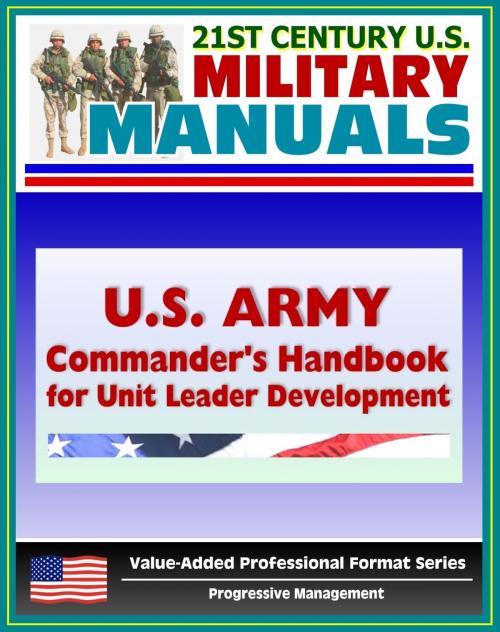U.S. Army Commander's Handbook for Unit Leader Development: Translating Leader Feedback, Prioritizing Leader Development Activities, Integrating Development into Day-to-Day Activities
Nonfiction, History, Military, United States| Author: | Progressive Management | ISBN: | 9781476153735 |
| Publisher: | Progressive Management | Publication: | May 5, 2012 |
| Imprint: | Smashwords Edition | Language: | English |
| Author: | Progressive Management |
| ISBN: | 9781476153735 |
| Publisher: | Progressive Management |
| Publication: | May 5, 2012 |
| Imprint: | Smashwords Edition |
| Language: | English |
Today's fast-paced, deployment-focused Army demands that a commander's first priority is a trained and ready unit. Leader development makes a substantial contribution to a unit's ability to train effectively and accomplish its mission. Yet commanders across the Army acknowledge the constant challenge to effectively implement unit leader development. This handbook is designed to provide commanders with an efficient and effective way to develop leaders. The handbook supports this goal by:
• Translating Army leader feedback for developing leaders into quick applications
• Prioritizing leader development activities under conditions of limited resources
• Integrating unit leader development into already occurring day-to-day activities
• Integrating FM 6-22 leader attributes and competencies consistently across Army leader development doctrine
This handbook draws on the input of successful Army commanders and non-commissioned officers, recent Army leadership studies, research on effective practices from the private and public sectors, and applicable Army regulations and doctrine.
Leaders develop from a combination of new challenges and experiences, new knowledge, and time for reflection. Leader development in the Army is a deliberate, continuous, sequential, and progressive process, grounded in Army values (FM 7-0). The result is Soldiers and civilians who are competent and confident leaders capable of decisive action. The operational (unit) assignment is the most effective setting for leader development. In leader development surveys, captains and majors ranked leading a unit along with personal examples and mentoring as the three most effective ways their leadership qualities are developed. The consensus among private sector leader development professionals is that a full 70 percent of leader development occurs on the job, 20 percent from other people (leaders, mentors), and 10 percent from training courses.
The organization and content of this handbook provide you with key principles, TTPs, and applications to implement the most effective methods of leader development.
Today's fast-paced, deployment-focused Army demands that a commander's first priority is a trained and ready unit. Leader development makes a substantial contribution to a unit's ability to train effectively and accomplish its mission. Yet commanders across the Army acknowledge the constant challenge to effectively implement unit leader development. This handbook is designed to provide commanders with an efficient and effective way to develop leaders. The handbook supports this goal by:
• Translating Army leader feedback for developing leaders into quick applications
• Prioritizing leader development activities under conditions of limited resources
• Integrating unit leader development into already occurring day-to-day activities
• Integrating FM 6-22 leader attributes and competencies consistently across Army leader development doctrine
This handbook draws on the input of successful Army commanders and non-commissioned officers, recent Army leadership studies, research on effective practices from the private and public sectors, and applicable Army regulations and doctrine.
Leaders develop from a combination of new challenges and experiences, new knowledge, and time for reflection. Leader development in the Army is a deliberate, continuous, sequential, and progressive process, grounded in Army values (FM 7-0). The result is Soldiers and civilians who are competent and confident leaders capable of decisive action. The operational (unit) assignment is the most effective setting for leader development. In leader development surveys, captains and majors ranked leading a unit along with personal examples and mentoring as the three most effective ways their leadership qualities are developed. The consensus among private sector leader development professionals is that a full 70 percent of leader development occurs on the job, 20 percent from other people (leaders, mentors), and 10 percent from training courses.
The organization and content of this handbook provide you with key principles, TTPs, and applications to implement the most effective methods of leader development.















